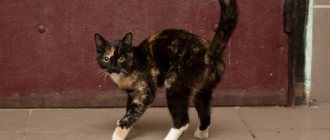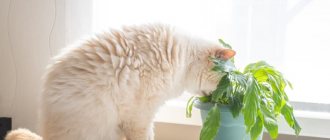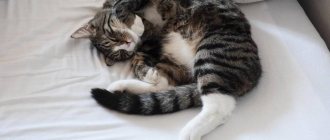As special studies among gardeners show, cats rank second among garden pests, second only to rats. Indeed, they can create many problems on the site. Therefore, many vacationers face a problem called “cats in the country.” How to keep cats away from your property? There are several proven means that you can use to quickly and easily get rid of the presence of your neighbor’s animals.
Why is this happening
Leaving special marks should not be confused with normal urination. If in the second case the animal relieves itself naturally in a specially designated place (tray), then marking the territory is a special ritual with the help of which the fluffy wants to say that he is the owner here. As a rule, purrs choose any furniture, walls, interior or entrance door, flower pots, etc. for this purpose. Animals living outside leave “marks” on tree trunks, bushes, plants, and fences. Do not rush to scold a cat for bad behavior; he is guided by instincts, genetics and a self-preservation mechanism.
Representatives of the feline genus have an excellent sense of smell; the odors left behind serve as a clear, readable identifier of the individual. But it’s one thing when a cat marks territory, what if a cat does it? This also happens, although much less frequently; the female also leaves her “calling cards”, marking the boundaries of her zone, declaring who is in charge in the house. Animals, being under stress, strive to protect themselves from outside encroachment and imaginary enemies.
Problems in a summer cottage from neighbors' cats
Sharpening their claws on trees
One of the favorite activities of a normal cat is sharpening its claws. Wood is the best choice for this activity. Although the tree-claw itself has a hard time. Young trees with delicate bark especially suffer from cat manicure.
Marking territory
Staking out your territory with a “fragrant” mark is a matter of honor for every adult cat. Not only urine is used, but also a special secretion that literally burns the plants. As they say, let the cat into the garden, and lo and behold... The “fragrant” marks are eaten away so that they cannot be removed.
3 ways to discourage a walking pig
Read
Why do pigs have nose rings and is there an alternative?
Look
Hunting birds
The cat is a hunter by nature and will hunt anything that moves. It's good if they're mice. But birds, which gardeners diligently attract to their plots to combat pests, also become objects of hunting. And for an adult cat it is possible to twist even a small poultry.
Chickens and chicks of other domestic birds often become victims of mustachioed hunters.
Trample and eat plants
What purr doesn’t love to bask in the sun, soak up a fluffy garden bed or flowerbed, taste young greenery, or just play with flowers. This is how flower beds and beds suffer.
Setting up unauthorized toilets in garden beds
In the spring, during this activity, cats who like to bury their “creations” simply dig up seeds and seedlings. And in the summer, the owners, digging up the carrots fertilized by their pet, experience far from tender feelings for their own and their neighbors Vaskas and Murkas. In addition, “cat manure” is not a fertilizer, but a possible source of infection with toxoplasmosis, a dangerous disease for people (especially for pregnant women).
You can become infected with helminths from cats: it is enough not to properly wash the crops from the garden.
When do the first cat marks appear?
For the first time, owners are faced with the problem of how to wean a cat from marking territory in the house after six months, by which time the fluffies become sexually mature. The onset of this period depends on the breed:
- large individuals (ragdoll, maine coon) - closer to 12 months;
- British - by 8 months;
- Siamese - by 5-6 months.
Personality, genetic predisposition, home environment, the presence of other pets and other factors matter. In some cases, you may be lucky and the question of how to wean a cat from marking will not become relevant. If the animal has a calm character, puberty occurs without incident, you may not see any odorous traces on interior items, doors or walls.
Cat antics on the site
If your neighbor's cats have taken a fancy to your summer cottage, it will be very difficult to keep them away. It would seem, why drive them away? After all, they are so beautiful, and they also catch mice. All this is true, but in the countryside a cat can do quite a bit of mischief. Here are just a few of their most common pranks:
- If small kittens go to the toilet not far from the house, then adult animals use neighboring plots for this, mercilessly destroying beds and flower beds.
- To secure a certain territory, cats are accustomed to marking it with urine or a special secretion. If it gets on vegetables or flowers, it can burn them. This alone is enough to make you think about how to keep other people’s cats away from your property.
- Another problem is that animals love to rest somewhere in the middle of a flowerbed or bed, imposingly basking in the sun. The fact that flowers or vegetables suffer from this, of course, does not bother them at all.
- Cats enthusiastically sharpen their claws not only on any furniture they like, but also on the bark of trees.
- Although cats catch mice, they love to hunt birds just as much. This also causes a lot of grief for summer residents who deliberately lure birds into their garden.
Therefore, with the onset of the summer season, the question of how to keep cats away from the property becomes more pressing.
How often do cats leave marks?
Here everything is individual, if females mark only during estrus, males can dirty the apartment all year round (usually in spring and autumn), causing significant inconvenience and discomfort to the owners.
On average, the frequency of leaving urine marks is about 2-3 per day, and “quiet periods” may be observed. But, unfortunately, it also happens that a purr marks at least 10 times in just one day. Here you need to decide what to do to prevent the cat from marking immediately.
Cat exploring the house
Once in an unfamiliar apartment, the first thing a kitten does is sniff everything. Receiving “fragrant” information, the animal analyzes the situation in the room. Is it warm here? Is it safe? Are there any other furry ones here?
Adult cats do the same. Even in a familiar, long-lived apartment, they never turn off their sense of smell.
After living in a new house for several days, the cat begins to establish its own rules in it: there will be a toilet here, there will be a sleeping place. Focusing on the existing smell and its preferences, the pet tries to arrange its life. The owner needs to intervene in such “feng shui” as soon as possible. If a cat goes to one corner for several days in a row, it will be difficult to wean him away from this place. Even with the most thorough cleaning, it is impossible to remove all the odorous “signals” left by Barsik.
In order to “curb” the owner’s pet, the owner will need a list of smells that repel cats.
Fluffy marks things and shoes with urine
What should you do if your cat marks everywhere, including shoes and even clothes? Surely you were not prepared for such a development of events when you got a pet.
The fact is that the imperious purr does not care where his scent marks will be; the main goal is to inform competitors and surrounding people that there is no place for a stranger in this territory. As for shoes, they exude the aroma of human body and sweat. The animal will try in every way to drown out extraneous odors, replacing the aromatic bouquet of shoes that is unacceptable to it with urine marks.
Clean the cat's litter box
If your cat uses pots with soil and plants as a toilet, then you need to pay attention to the cleanliness of her litter box. It is possible that you rarely clean it. Try to replace the filler and remove dirt on time.
Seven daily habits of happy people
Only on a soft spot: Russian Domostroy forbade punishing children in any other way
The star of the series “Sultan of My Heart” spoke about the choice of his future wife
Sometimes cats refuse to go into a clean litter box, but show interest in flower pots. In this case, you need to choose a different type of cat litter.
Animal marks a person
In certain cases, formed behavioral instincts force the cat to urinate on the owner. In this way, the purr declares its rights, making you a member of the imaginary cat clan. On the one hand, you should be proud that you are accepted as one of their own, on the other hand, this is unacceptable and everything must be done to stop the cat from marking the apartment and you.
It also happens that a cat perceives its owner as a competitor; this is especially typical for animals that were picked up on the street at puberty. Fuzzies, obeying natural instinct, continue to fight for themselves, mistaking you for a competitor.
Placiterium staghorn
If you have a cat at home, then try to choose suitable types of plants for landscaping. For cat owners, the staghorn fern is ideal. In nature, it grows on tree trunks and branches. At home, platicerium is grown on vertical blocks that can be mounted high on the wall.
What is worth seeing in Sao Paulo: the inimitable Ibirapuera Park
Traveling for your love: what type of vacation to choose to strengthen your relationship
The penalty for laziness: how to maintain high productivity with low motivation
Platycerium staghorn is an unpretentious plant. It requires watering only once a week. The leaves of this fern contain no toxins and are safe for cats.
Where do cats mark most often?
Despite the strong, unpleasant aroma of cat urine, it is not easy to find the specific place where the little villain urinated. Typically, the crime scene is walls, cabinet fronts, furniture, a refrigerator, wallpaper, the owner’s clothes or shoes, or another pet’s sleeping place.
Some fluffies choose unusual, hard-to-reach places that a good sense of smell is not enough to identify. A UV lamp or flashlight with LED beams will help in the search; traces of urine are highlighted with a bright yellowish-neon spot.
Smells that repel cats
Cats smell more keenly than humans. Very often the tastes of the cat and the owner do not coincide. Let's figure out what smell cats can't stand. You need to approach a specific scent and pet experimentally.
Perfumery
Many owners of annoying mustache-tailed pets, thinking about the question of what smell repels cats, have come to the conclusion that not all aromatic products that we love have a similar effect on cats. On the contrary, everything goes according to the opposite principle. Those smells that people love are not at all digestible by cats. That is, the kitten’s favorite blanket can simply be sprayed with perfume.
Rut oil
Many cats are afraid of the smell of oil made from the leaves of rue bushes. It has been noticed that if a branch of this bush is placed near some place undesirable for the presence of a cat, then it will not even come close to it.
You need to be careful, as rue branches can cause an allergic reaction on the human body.
Citrus
Many cats hate the smell of citrus fruits. Lemon is considered the most effective in this matter. Its scent is pungent for cats.
- You can squeeze out some freshly prepared juice in the corner of the room that your pet has spotted. This method will help to keep him away from the unfortunate place for a while.
- Furniture that is used as a scratching post can be rubbed with citrus peel.
- If you dilute lemon or orange juice with water and sprinkle it over any surface, for example, over your dad’s favorite chair, then the problem of hair appearing on your dad’s trousers will be solved.
- To repel cats from furniture, you can use a citrus-scented polish. It is only necessary from time to time to refresh the smell that is so disliked by pets.
After all, besides, cats do not like the smell of citrus fruits, but for people it is very pleasant.
Onion and garlic
It turns out that not only people, but also cats have problems with onions. Naturally, unpeeled onions and garlic will not give any result. And grated vegetables, or cut into small pieces, will really scare away a restless kitten. Garlic and onions can be rubbed on objects or sprinkled anywhere. Another option is to mix onion or garlic with water and spray the solution on the areas that kittens love. Of course, there is one problem with using these vegetables: this smell, so disliked by pets, also does not inspire people.
Homemade repellent
You can buy essential oils at the pharmacy, for example, lavender, rosemary, lemongrass. The purchased oil must be diluted with water in a ratio of one part water to three parts oil. Cotton pads should be soaked in the resulting solution and placed in places inaccessible to the naughty person.
Vinegar
One of the commonly available substances that is found in every home is vinegar. With its harshness, it irritates the pet’s nasal canal, thereby being an excellent deterrent. Vinegar is also good at eliminating the smell of cat urine in your home. The cat reacts strongly to this option - it avoids the place where even a drop of vinegar has fallen for a long time.
Prevention or how to stop a cat from marking in the house in advance
Uncastrated animals begin their “dirty deeds” no earlier than six months of age; until this period, living together with a kitten will not cause inconvenience. Problems begin after reaching sexual maturity, at which time the male’s leadership qualities begin to appear. Unfortunately, it is not possible to prevent the development of natural changes in the body.
At the same time, it is necessary to pay attention to the education of the animal:
- show your child who is boss in the house, do not allow permissiveness;
- pay attention to the fluffy, do not leave him alone for a long time;
- Make sure your cat has toys and play with him.
Do not use force against the cat under any circumstances, do not show aggression, do not throw objects at it, do not raise your voice. Harsh parenting methods will provoke an aggressive reaction, the purr will mark more diligently, thereby trying to protect itself. The only effective preventive measure is competent education and timely hygiene measures.
Smells that cats don't like
To save this or that area of the apartment or a piece of furniture from a pet, this place must acquire an unpleasant smell that frightens the cat. Cats don't like:
- Strong perfume aromas.
- Citrus aroma.
- The smell of strong alcohol.
- Essential oils of lemongrass, lavender and rosemary.
- Fragrant rue oil.
- Acetic acid.
- Onions, garlic and spices.
These odors have different effects on the animal. Some of them cause a feeling of fear, others – disgust, and still others – anxiety. But they all lead to one goal - to protect personal belongings and certain places in the apartment or entrance from the cat’s interest.
Read more about how to stop a cat from shitting.
Perfume aromas
Cats do not like all perfume scents. Some odors of perfumes or colognes, especially sharp and persistent ones, cannot be tolerated by animals. You can experiment and find that perfume aroma that will not cause discomfort to the owner, but will scare the cat away from the owner’s bed or favorite blanket.
The scaring method is controversial - it does not always help.
Citrus aromas
The smell of lemon, lime or grapefruit works well to repel cats. Unlike people who enjoy citrus scents, animals do not have a love for them. They find citrus smells too strong and unpleasant.
To make aromatic barriers at home, spray lemon juice or rub lemon peel on prohibited areas.
To increase the effect, it is recommended to use citrus zest or chopped peel. It can be placed in areas that you want to protect from cat interest.
The smell of strong alcohol
The aroma of strong alcohol, such as vodka, whiskey or cognac, disgusts cats. Cats cannot tolerate these odors on a physiological level. At home, it is enough to pour a few drops of these drinks and place them for a while in the corners where the cat shits - this will discourage the animal from any desire to do this.
Essential oils of lemongrass, lavender and rosemary
Cats do not like the essential oils of these plants; they try to avoid places with the smell of rosemary, lavender and lemongrass. You can buy bottles of essential oils at any pharmacy or specialty store.
You can make your own budget version of a natural repellent for cats. To do this, mix all three oils and dilute them with water in a ratio of 1:3. Cotton pads are soaked in the resulting mixture and placed in places that pets do not need to visit.
Rue oil
The scent of fragrant rue is an effective cat repeller. Cats cannot stand the smell of this plant. Rue is a salvation for those owners who have tried all sorts of home remedies, but have never found something to repel cats. You can use either ready-made oil from the pharmacy or fresh plant branches.
This product must be used with great caution - it is a strong allergen.
Acetic acid
An affordable and effective cat repellent is acetic acid. The smell of vinegar irritates the mucous membranes of a cat's nose, so animals are afraid of it. To scare away a cat, simply moisten the surfaces with a damp cloth or spray them with a spray bottle.
Onions, garlic and spices
The pungent aroma of onions and garlic disgusts animals. Cats have approximately the same reaction to some spices: cumin, mustard, coriander, pepper and fennel. Some housewives, knowing what smell repels cats, place saucers with chopped onions, garlic or spices on the windowsill to protect their favorite flowers from the encroachments of cats.
What to do if your cat marks
The peak of “activity” occurs in the autumn-autumn period, this is explained by hormonal changes in the cat’s body. Zoologists associate the strengthening of sexual instincts with an increase in the duration of daylight hours, as well as the peculiarities of the biological rhythm of the animal.
In search of an answer to the question of what to do to prevent a cat from marking, owners are trying non-standard solutions. One of these can be called keeping an animal during an “exacerbation” in a darkened room. If the “irreparable” has already happened, it is necessary to clean the stained area, thoroughly wash the furniture and walls, apply a disinfectant and repellent spray.
Veterinarians do not recommend using detergents containing bleach; bleach vapors are dangerous for people and animals. Regular baking soda, a weak solution of vinegar, or special products that neutralize the pungent odor of urine will do.
At worst, if you don’t have a special spray on hand, you can use aromatic oils, eau de toilette, incense sticks, perfume or air freshener.
How to protect birds?
There is a good way to protect birds from cat hunting. For this, special collars are used. When the cat makes a sudden movement, they emit a loud sound signal, and the bird has enough time to fly away. At the same time, a red light on the collar lights up. You can also hang several small bells around the animal’s neck. This will scare away the birds and make it difficult for the cat to hunt.
It is better to place bird feeders in open spaces. It’s even better to lock your cat at home at night, because the dark time of day is the favorite time for active hunting.
Thus, dealing with the problems caused by cats is not so difficult. Using special tools and the experience of other summer residents, you can permanently solve the problem of how to keep cats away from your property and raise your pet so that it does not cause harm to vegetables, flower beds and trees. The most important thing is to be patient, because re-educating mustachioed striped animals requires time and calm.
How to remove traces of urine in an apartment
Even when you have decided what to do to prevent the cat from marking the house, you need to be prepared that the chosen measures may not give immediate results. Be patient, remember that the cat does nothing to spite you, he is guided by natural instincts that cannot be resisted.
List of what you will need in the fight for cleanliness in the house:
- detergents;
- sprays and liquids for cleaning carpets;
- odor neutralizers that wean the animal off marks.
Of course, you can use more affordable means - vinegar solution, hydrogen peroxide, citric acid, but their effectiveness is much lower, and besides, you risk ruining the upholstery of an expensive sofa.
DIY natural repellent for cats
You can make an effective remedy yourself in a few minutes using available materials.
- Add peppermint leaves to the water, let it steep for a few minutes, put it in a bottle, or use it to wash floors.
- Collect peelings of citrus fruits - orange, lemon, grapefruit, scatter behind furniture, in the corners of rooms, near the sofa. You can cut off the zest, pour boiling water over it, and leave. The result is a repellent spray with universal action. The product stops cats from scratching and marking. Similarly, an ode is used, into which the juice of one fruit should be squeezed.
- Grind the spices and scatter them in a path in places that need to be protected from the cat. This is usually done when she has settled into climbing into flower pots. The aroma irritates the receptors, the animal begins to sneeze and runs away.
- Mix chopped rosemary, lavender, and cinnamon in equal proportions. Fill with water, leave for a day, pour into a spray bottle. The spray can be used to treat any surface. It is worth noting that rosemary can only be used for a short time, as it is toxic for cats.
- Mix apple cider vinegar and water in equal proportions. Used as a spray, liquid for washing floors, furniture, doors. In addition, you can add essential oils of citronella, lavender, lemongrass, and peppermint.
You will have to use the products often until the cat develops the correct reflex.
In addition to homemade repellents, there are special preparations to repel cats. They contain natural substances and are safe for people to use in residential areas. The active substances, as a rule, are essential oils and plant extracts.
What to do to prevent a cat from marking - use folk remedies
As you know, folk “proven” methods exist in solving any issue; weaning a cat from a bad habit is no exception. Some owners use the scent of citrus to influence their pet's behavior; for others, the most common laundry soap helps.
Try treating the cat's favorite places with ammonia, put wormwood or a bag of aromatic spices there, turmeric, mustard powder, red and black pepper will do. Fluffies do not like substances that emit a pungent odor, so with a high degree of probability, they will avoid this place, or simply find a new one, depending on their luck.
What smell to scare away a cat?
If you don’t want to buy special repellents in the store that can be harmful, but you still need to drive her away from some place, various non-harmful odors will come to the rescue.
Of course, every cat is unique, and a certain scent may not work on yours. But there are many options, and you will definitely find what you need.
Plants
Does your cat constantly climb into the garden or flowers on the windowsill? The problem can be solved by understanding what grass to plant in the right places. Certain plants, the smell of which cats cannot stand, will easily help you. The most common options:
- lavender;
- eucalyptus;
- rue;
- lemongrass;
- coleus dog;
- mint.
Spices
What makes food tastier for us is absolutely not pleasant for our pets. Few cats will eat meat marinated with pepper or mustard.
This knowledge can also be used to scare away an impudent animal from certain places in the apartment.
List of spices that your cat won't like:
- black pepper;
- red pepper;
- cinnamon;
- garlic;
- horseradish;
- thyme;
- mustard;
- Cayenne pepper;
- onion.
All this can be mixed, rub the desired surfaces with the mixture, pour it into a spray bottle, or simply pour it into the corners of the room. You can prepare a simple spray solution. To do this, you will need a cup of water brought to a boil and two tablespoons of ground black pepper. Mix this and pour into a spray bottle. Now you have a working solution with which you can easily stop your pet from scratching the new chair with its claws.
Vinegar
Vinegar is a simple and cheap repellent. It is perfect if the cat has taken up the habit of marking corners in the room. You just need to add vinegar to the water for washing the floor, and you will get rid of this unpleasant problem. The main thing is not to overdo it, because acetic acid can also cause burns to the mucous membrane.
Citrus
If for people the New Year is a tangerine paradise, then for cats this period is more like hell. Cats do not like the smell of any citrus fruit, be it lemon, orange, tangerine, lime, grapefruit, pomelo and others. Moreover, it is the smell emanating from the peel of these fruits that irritates the animals’ sense of smell.
This can be used. You can simply spread citrus peels on the table, windowsill or armchairs. You can finely chop it into zest and mulch the soil in the garden. Or simply rub the desired surface with the crust.
Coffee
Coffee is not only a boost of energy after a sleepless night. Ground coffee can be used to successfully repel cats. The pungent odor of this substance is very unpleasant to them.
Bananas
Remember the funny videos where cats jumped away in horror from these tropical fruits? People have come up with different theories to understand this behavior of our pets. It turned out that the peel of a ripe banana gives off an odor that reminds cats of acetone. This smell is unpleasant to them, so they try to avoid it.
Essential oils
A cheap, simple and fragrant way to scare a cat away from an unwanted place. The smell of essential oil is useful and pleasant to us, but not to our pets. You can use citrus, mint, or other oil options, as long as you like them. Just a few drops on the surface of the furniture, and the cat will no longer approach it.
We correct the cat's behavior with special means
Cats often cause mischief in the house due to an unstable emotional state, which can be caused by moving, the appearance of a new pet, frequent quarrels, the birth of a child, and other factors. In this case, you need to help the cat survive stress with the help of sedatives.
It is advisable to choose plant-based homeopathic remedies that do not have a sedative effect. Regarding the use of hormonal contraceptives, their effectiveness has not been proven in the fight against feline marking in the home.
Special repeller
You can buy a lot of products in stores that will solve the problem of how to keep cats away from the garden. One of them is a special repeller. There are various models designed for areas of different sizes. Modern repellers are designed for both cats and rodents, dogs and even foxes. They emit ultrasonic signals that are very irritating to animals, but are practically not perceived by humans. In this case, the repeller can be positioned so that the action of the device extends precisely to the areas that need protection.
How to stop a cat from marking the door
Quite often, purrs begin to mark their territory immediately upon entering the house, that is, they leave drops of urine on the front door. To discourage your pet from damaging the door leaf, thoroughly wash the surface, remove the unpleasant odor, and apply a product with a cat-repellent scent.
Additionally, you can scatter strong-smelling spices near the mat, put a slice of lemon, or leave a cotton swab dipped in ammonia.
Industrial products
Industrial cat repellents are mainly presented in the form of chemical aerosols and sprays. Their functions are varied. For example, protecting shoes, furniture, walls, floors and even the most secret corners in the house from an unwanted place for a pet to defecate. Sprays are also used to eliminate the unpleasant odor of cat urine.
It is best to choose products with natural composition:
- Water is the main component of a chemical spray or aerosol.
- Eucalyptus (lemon, lavender, castor, rue) oil – gives the compound a characteristic pungent odor that repels pets.
- Glycerin is an emulsifier - an auxiliary substance for mixing immiscible liquids. For example, water and essential oil.
The controversial component in the spray or aerosol is methylchloroisothiazolinone. This substance belongs to the group of synthetic preservatives that destroy bacteria, fungi and mold. It is a powerful allergen and toxic to cells of the immune system of animals and humans. The presence of this component in deterrents can cause severe allergic reactions and dermatitis.
What to do if other people's cats are marking your territory
If your local area is regularly attacked by yard cats, each of whom considers it their duty to mark it, you can install an ultrasonic repeller near the house.
A special device produces sounds that are harmless to humans and animals and repel uninvited guests. Please note that this solution is suitable for those who do not have their own pets, otherwise your cat will also experience discomfort.
Homemade repellent
Citrus peels can be successfully replaced with essential oils. Just dilute a few drops in water and the cat repellent is ready. To enhance the effect, the mixture is sprayed in the air next to the plants, or you can sprinkle the soil in the pot. It is necessary to ensure that the liquid does not get on the plant itself.
IN THE PHOTO: A small container with a spray bottle is perfect for storing cat repellent.
To prepare a spray to save flora, you need to mix:
- 60 ml. water;
- 2 drops of lemon essential oil;
- 2 drops of wild orange essential oil;
- 2 drops of lavender essential oil.
If the cat marks the territory near the house
You already know what to do when a cat marks in the apartment, it’s time to figure out what to do with a pest that regularly does “dirty things” on the street.
The solution should be comprehensive, try to redirect the pet’s attention, use a standard set of repellents.
For distraction you can:
- install a gaming complex;
- buy a new toy;
- use veterinary drugs to correct behavior.
Organizing a place to relieve yourself outdoors can also help. If you need to use a special tray for your home, you can organize a sandy mound in the fresh air, planting aromatic grass around it that is attractive to cats.
Industrial cat repellents
Modern industrial cat repellers perform two functions:
- protect furniture, walls, household appliances and shoes from unwanted cat attention;
- scare cats away from places where they do not want to poop.
Typically, such products are produced in the form of sprays, which are aimed at educational work with a cat. Their use is most effective in enclosed spaces; spraying in open areas is pointless. On the street, these products quickly lose their properties. Special repellers differ from home remedies in that they not only drive away the cat, but also neutralize the odors of cat marks.
If cats shit in the entrance
If the marks left in the apartment cause inconvenience only to the owners, an unpleasant smell in the front door is a collective problem, affecting all residents. To eradicate the problem, it is necessary to castrate all males who live in nearby areas.
The solution will kill several birds with one stone - you will prevent the growth of the population of stray animals, solve the issue of unpleasant odor, and get rid of cats meowing under the windows. Install a door with a locking lock at the entrance to prevent uninvited guests from entering. Otherwise, the solution is standard - thorough cleaning, treating surfaces with repellents and sprays to neutralize odors.
How to use for repelling?
The need to use odors that are unpleasant for cats against them is due to a number of reasons, including:
- going to the toilet in the wrong place;
- excessive interest in indoor flowers with possible negative consequences for them;
- increased interest in human food;
- "occupation" of a specific territory with attacks on those who enter or lay claim to it.
To get rid of the unpleasant odor of urine that remains in the room after going to the toilet in the wrong place, you can use the following remedies.
- Vodka - all surfaces are wiped with it, which allows you to quickly eliminate the unpleasant cat odor, but another problem arises - the presence of a persistent alcohol aroma, which can only be removed by prolonged ventilation.
- Potassium permanganate solution - this product should be concentrated enough to rid the house of an unpleasant odor, but if the crystals do not completely dissolve in water, the substance will leave stains, especially on fabric surfaces.
- Lemon juice – you can make it from water and lemon or dilute it into a powder form. This product helps remove unwanted odor and prevents the furry animal from repeating pranks in the same place.
- Vinegar solution - dilute with water in a ratio of 1:3 and wipe hard surfaces. If you need to apply it to fabrics, it is better to use a spray bottle and remove excess moisture with paper napkins or towels.
- Soda - to get rid of the smell of urine completely, you need to sprinkle the area of the cat's pranks with soda and pour hydrogen peroxide over it, leaving it like that for some time. You can apply this procedure at night, and then thoroughly wipe the contaminated area. It is not advisable to use this option on fabric surfaces, as the product will leave streaks.
If your pets start climbing on the table or walking along the window with indoor flowers, you must immediately take measures to stop such behavior. In the case of flowers, you can lay out orange peels on the windowsill or add zest to the soil. A good deterrent would be to use the feces of feline enemies - foxes and coyotes. If we are talking about a table, then you can use perfumes or essential oils to treat the surface. In addition, you can leave the moistened sponge on the surface.
In some cases, it is possible to teach a pet to behave correctly, and in some, the opposite effect is obtained, since the cat develops panic attacks and other mental disorders that can harm others.
Another problematic situation that summer residents or those who have a vegetable garden may encounter is the excessive interest of their cat or other people’s animals in the land. Cats associate a garden with a litter box, so they can relieve themselves there, doing it often, which is unlikely to please the owner. To deal with this problem, you can use several tactics.
- Fertilize and moisten the garden area, which will discourage cats from traveling through it, much less going to the toilet there, because they are clean animals and will not get into the dirt.
- It is worth inspecting the area for places through which cats enter the garden and eliminating them. If you don’t find any, you should make a small ravine near the fence and fill it with gravel, which cats really don’t like.
- If you can’t fight the animals, then you can allocate a certain area for them where they will spend time without spoiling the harvest in the remaining beds. To achieve this result, it is worth fencing off a small area, filling it with sand and irrigating it with a small amount of valerian, which will immediately attract animals and distract them from the rest of the territory.
- To scare away unwanted guests, you can plant those plants that emit an unpleasant and pungent aroma. This is hot pepper or coleus dog.
Any fight against pranks should be moderate, without excesses and harm to animals, so you should be as careful as possible in choosing means to scare away cats in each specific case.
It's worth fighting
Many summer residents refuse to think about how to keep dogs away from their property, feeling sorry for the unfortunate animals. However, they should remember that stray flocks are dangerous for both people and pets. Moreover, the harm caused to homeless animals can be different.
In the first place, of course, are bodily injuries. Aggressive tramps sometimes attack completely spontaneously. At least for no apparent reason. And if a domestic dog is controlled by its owner (albeit often not fully), then a stray dog is uncontrollable. And his aggression is fueled by mental disorders - and they appear in the animal after a few months, or maximum after two years of homeless life. Dog attacks result in serious injuries.
Stray flocks cause no less harm to health. And everyone – from birds to humans. Even mice become infected with worms, rabies, and lichen, spreading the infection throughout the home. And skin diseases spread directly - they can be obtained by petting a sick dog (which kids love to do) or by contact with an object that he touched.
So you need to ward off someone else’s dog as quickly as possible, while there is not much chance of contracting an infection. And you need to do this before she attacks your Bobik or Murka.
How to get cats out of the basement
In urban areas, cats usually settle in the basement, it is warm there, people appear infrequently.
- Chopped onions and garlic (lemon or tangerine peel) scattered around the basement will quickly wean them off.
- Repellent solution: stir a few tablespoons of ground black pepper in 500 ml of hot water, let it brew, pour into a spray bottle, and spray in the corners.
- Spraying with vinegar will cause cats to go into shock.
In the basement, cats do not bother anyone, but if the basement is dirty and damp, cats can get sick:
- fungal diseases
- dermatological diseases
- chlamydia.
Plus they can carry rabies and other diseases. This danger appears if there are rats in the basement, which cats hunt. Furry hunters often die because rats are poisoned with poisons to which they are immune.
In this case, the responsibility of the housing office is not to exterminate cats, but to bring the basement premises into decent shape. Treatment against insects and rodents will prevent the spread of all the unpleasant things listed above.
Cats are distrustful and will not be picked up, so stories about infected children have no basis.
As for worms, this is a common problem that is only remotely related to cats. Most children become infected with worms, and prevention of infestation must be carried out regularly, regardless of the presence of cats somewhere in the basement.











